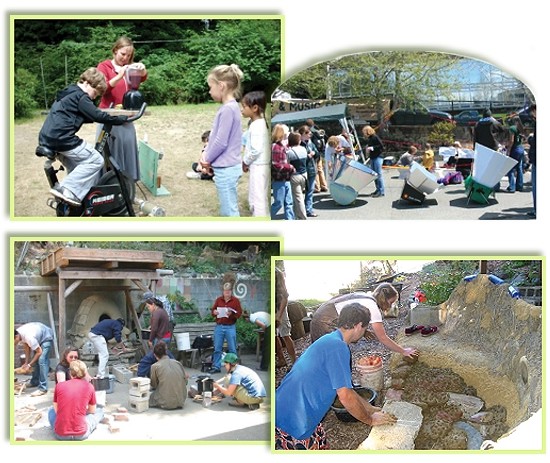|
The Golden
Age Lifestyle |
Campus Center for Appropriate Technology

By Hong Kong News Group (Originally in English)
A healthy planet and its ethical treatment is the value for the students at Campus Center for Appropriate Technology in Humboldt State University, California, USA. CCAT has been working for 20 years to help bring sustainable living into reality and demonstrates that sustainable living is an efficient solution for global warming and a healthy planet.
Sustainable living” is a lifestyle that uses resources in a way that can be sustained without exhausting any natural resources.
CCAT is a demonstration home and educational center for sustainable living. It was started in 1978 by a group of students, with the support of faculty and administration. CCAT produces no waste and uses less than five percent of the energy consumed by the average American home. Among the many appropriate technologies demonstrated are solar and wind electric systems, a solar hot water system; solar food cookers; a bio-fuel refinery and organic herb, vegetable and native plant gardens. CCAT also demonstrates alternative building techniques using materials such as straw-bale, cob and bamboo. CCAT provides hands-on experiential learning opportunities in sustainable living to students, classes and the general public.
CCAT is also entirely off the electrical grid and relies on solar panels, a wind turbine, and a bio diesel generator. Here are some examples of things that can be applied in the average home: 1) Solar panels. They can be expensive to install, but the savings over the long run more than pay for their initial cost. They even work on a cloudy day. 2) A cold box. It can store most food that needs refrigeration in the winter, and in the summer it is good for fresh fruit and vegetables. 3) A hot box. It can cut a lot of cooking time in half. 4) Reflector cookers. They can direct sunlight into a concentrated beam that acts as a stove burner. 5) Compact fluorescent light bulbs. They use about a quarter of the power of normal incandescent light bulbs.
“When we start making environment
conscious decisions in our everyday lives, government policy will shape
itself to suit us,” said Eddie Tanner, a current Co-Director at
CCAT. “All it takes is a first step. Start thinking about ways of
reducing your house’s electricity bill or trash-load. Try it out,
and then get your friends to do it too.” ![]()
(from “Earthkeeper Hero-CCAT”)
http://www.humboldt.edu/~ccat/faq.html
| << | Contents | >> |
| Refer
this page to friends |
||